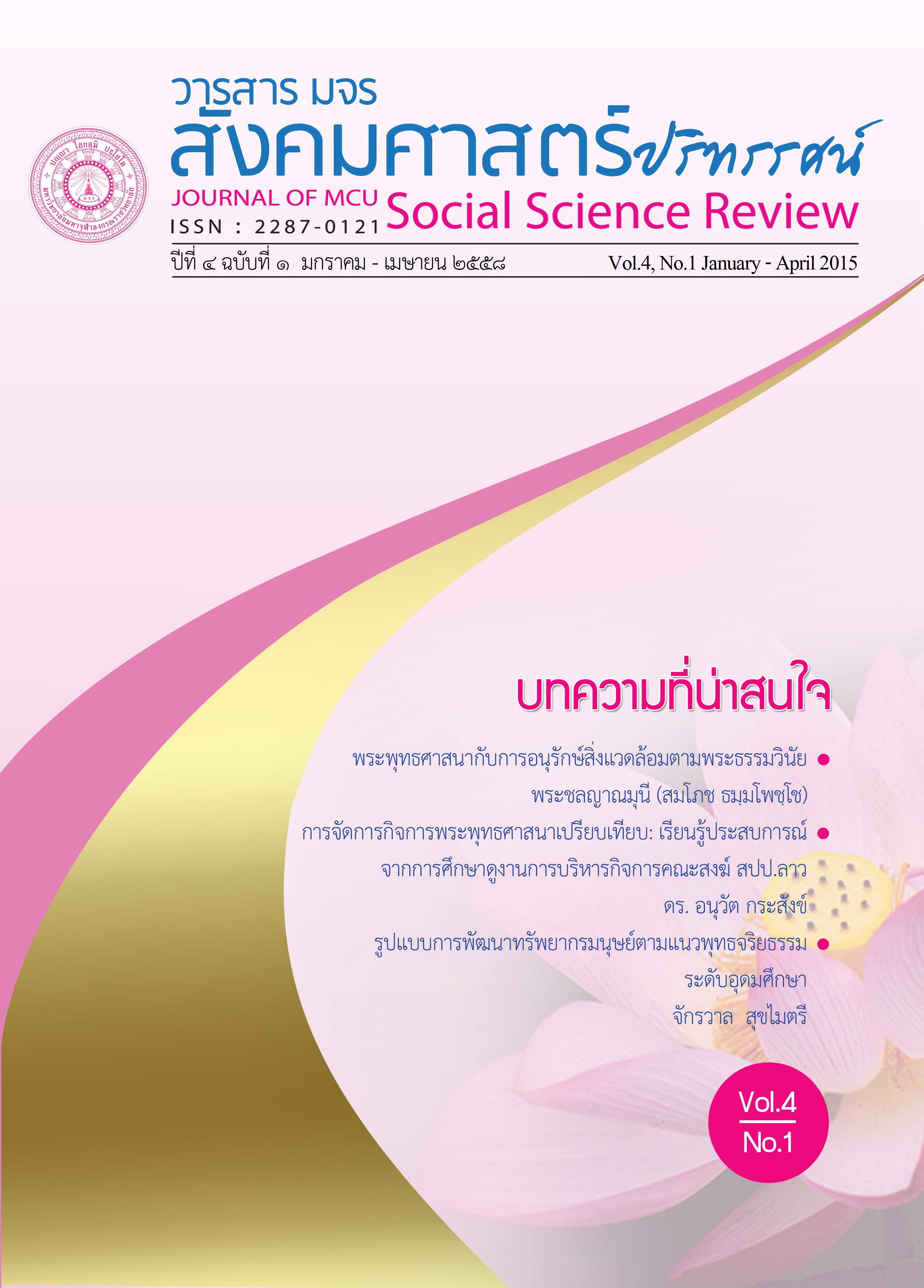รูปแบบการพัฒนาทรัพยากรมนุษย์ตามแนวพุทธจริยธรรมระดับอุดมศึกษา
คำสำคัญ:
การพัฒนาทรัพยากรมนุษย์, พุทธจริยธรรม, ระดับอุดมศึกษาบทคัดย่อ
บทความวิจัยฉบับนี้ มีวัตถุประสงค์คือ (๑) เพื่อศึกษาแนวคิด ทฤษฎี และ หลักพุทธธรรมที่สอดคล้องกับจริยธรรมที่เหมาะสมสําหรับการพัฒนาทรัพยากรมนุษย์ที่เป็น นักศึกษาระดับอุดมศึกษา (๒) เพื่อศึกษาสภาพปัญหาและอุปสรรคการดําเนินการด้านจริยธรรมของ นักศึกษาระดับอุดมศึกษา และ (๓) เพื่อเสนอรูปแบบการพัฒนาทรัพยากรมนุษย์ตามแนว พุทธจริยธรรมระดับอุดมศึกษา ระเบียบวิธีวิจัยเป็นการวิจัยเชิงเชิงคุณภาพ (Qualitative Research) เก็บข้อมูล ด้วย ๒ ขั้นตอน คือ การสัมภาษณ์เชิงลึก โดยกําหนดผู้ให้ข้อมูลหลักจํานวน ๓๐ รูป/คน เลือกแบบเจาะจง จากผู้ทรงคุณวุฒิ เครื่องมือในการเก็บข้อมูล คือ แบบสัมภาษณ์เชิงลึกที่มี โครงสร้างเก็บข้อมูลด้วยการสัมภาษณ์เชิงลึกตัวต่อตัว วิเคราะห์ข้อมูลด้วยวิธีการวิเคราะห์ แบบอุปนัยและพรรณนาความ และจากการสนทนากลุ่มโดยเลือกผู้ร่วมสนทนากลุ่มเฉพาะ จํานวน ๑๐ คน เลือกแบบเจาะจงจากผู้ทรงคุณวุฒิและมีส่วนเกี่ยวข้องกับการพัฒนา ทรัพยากรมนุษย์ เครื่องมือในการเก็บข้อมูล ได้แก่ หัวข้อสนทนาที่พัฒนาจากข้อมูลที่ได้ จากการสัมภาษณ์เชิงลึก เก็บข้อมูลด้วยการสนทนากลุ่ม วิเคราะห์ข้อมูลด้วยอุปนัยวิเคราะห์ และการพรรณนาความ
ผลการวิจัยพบว่า ๑. แนวคิด ทฤษฎี และหลักพุทธธรรมที่สอดคล้องกับจริยธรรมที่เหมาะสมสําหรับ การพัฒนานักศึกษาระดับอุดมศึกษาพบว่า ๑) การพัฒนาทรัพยากรมนุษย์ เป็นการเปลี่ยนแปลง กระบวนการคิดและการประพฤติปฏิบัติของมนุษย์ให้มีความเจริญขึ้นทั้งในเรื่องของความรู้ ทักษะ ความสามารถ เพื่อเพิ่มประสิทธิภาพ ประสิทธิผลต่อในการพัฒนาตนเอง องค์การ สังคม ๒) พื้นฐานการเรียนรู้ของนักศึกษาระดับอุดมศึกษาที่มีความแตกต่างกันย่อมมีผลต่อพฤติกรรม การปฏิบัติในสิ่งที่ถูกต้อง ดีงาม ซึ่งมีอยู่ ๔ ประการ คือ ๑ ครอบครัว ๒ สถาบันการศึกษา ๓ กลุ่ม เพื่อน และ ๔ สภาพแวดล้อมรอบตัวนักศึกษา ๓) หลักธรรมทางพุทธศาสนาที่มีความสอดคล้องกับ จริยธรรมในการพัฒนานักศึกษาระดับอุดมศึกษา คือ หลักกุศลกรรมบถ ๑๐ เพราะเป็นหลักธรรม ที่เป็นพื้นฐานของชีวิต ถ้าประพฤติปฏิบัติในสิ่งที่ดีก็จะเกิดสิ่งที่ดี
๒. สภาพปัญหาและอุปสรรคการดําเนินการด้านจริยธรรมของนักศึกษา ระดับอุดมศึกษา พบว่า เกิดจากตัวของนักศึกษาเป็นสําคัญ ซึ่งสามารถแบ่งได้เป็น ๓ ด้าน คือ ๑) ปัญหาด้านจริยธรรมทางกาย ซึ่งเป็นปัญหาที่เกี่ยวกับการประพฤติ การปฏิบัติ การแสดงออก ด้วยการกระทํา ๒) ปัญหาด้านจริยธรรมทางวาจาเป็นปัญหาที่เกี่ยวกับการใช้คําพูดในการสื่อสาร หรือการใช้วาจาในการดําเนินชีวิต และ ๓) ปัญหาด้านจริยธรรมทางใจเป็นปัญหาที่เกี่ยวกับการใช้ ความคิดให้รู้ว่าสิ่งใดถูกต้อง ควรกระทํา หรือสิ่งใดไม่ถูกต้องไม่ควรกระทํา
๓. รูปแบบการพัฒนาทรัพยากรมนุษย์พุทธจริยธรรมระดับอุดมศึกษาโดยนํา หลักกุศลกรรมบถ ๑๐ มาปรับประยุกต์ใช้ สามารถแบ่งได้เป็น ๓ รูปแบบ คือ๑) รูปแบบด้าน การให้การศึกษา๒) รูปแบบด้านการฝึกอบรม ๓) รูปแบบด้านการพัฒนา
เอกสารอ้างอิง
(๑) หนังสือ
กระทรวงศึกษาธิการ. กรมวิชาการ. หลักสูตรการศึกษาขั้นพื้นฐานพุทธศักราช ๒๕๔๔. กรุงเทพมหานคร: พัฒนาคุณภาพวิชาการ (พว), ๒๕๔๔.
ราชกิจจานุเบกษา, พระราชบัญญัติการศึกษาแห่งชาติ พ.ศ. ๒๕๔๒. เล่ม ๑๑๖ ตอนที่๗๔ ก. ๑๙ สิงหาคม ๒๕๕๒.
(๒) วิทยานิพนธ์
เกรียงไกรยศ พันธุ์ไทย, อิทธิพลของพฤติกรรมผู้นําวัฒนธรรมการทํางานในองค์การ และกิจกรรมการพัฒนาทรัพยากรมนุษย์ที่มีต่อผลการปฏิบัติงานของพนักงานรัฐวิสาหกิจ. รัฐประศาสนศาสตร์ดุษฎีบัณฑิต. คณะรัฐประศาสนศาสตร์: สถาบันบัณฑิตพัฒนบริหารศาสตร์, ๒๕๕๒.
กรภัทร์ จารุกําเนิดกนก. การบริหารทรัพยากรมนุษย์ในองค์การสาธารณประโยชน์ด้านสังคมสงเคราะห์เกี่ยวกับเด็กและสตรี รัฐประศาสนศาสตร์ดุษฎีบัณฑิต. คณะรัฐประศาสนศาสตร์: สถาบันบัณฑิตพัฒนบริหารศาสตร์, ๒๕๕๔.
ชัยยุทธ ชิโนกุล. กลยุทธ์การฝึกอบรมและพัฒนาพระภิกษุสามเณรในจังหวัดชายแดนภาคใต้, พุทธศาสตรดุษฎีบัณฑิต สาขาวิชารัฐประศาสนศาสตร์ บัณฑิตวิทยาลัย: มหาวิทยาลัยมหาจุฬาลงกรณราชวิทยาลัย, ๒๕๕๖.
นุชตรียา ผลพานิชย์, แนวทางในการพัฒนารูปแบบการฝึกอบรมของนักศึกษาคณะวิทยาการจัดการมหาวิทยาลัยราชภัฏนครราชสีมา รายงานการวิจัย. คณะวิทยาการจัดการ: มหาวิทยาลัยราชภัฏนครราชสีมา, ๒๕๕๓.
วีรชัย อนันต์เธียร. กลยุทธ์การพัฒนาจริยธรรมสําหรับเยาวชนไทย, พุทธศาสตรดุษฎีบัณฑิตสาขาวิชารัฐประศาสนศาสตร์, บัณฑิตวิทยาลัย:มหาวิทยาลัยมหาจุฬาลงกรณราชวิทยาลัย, ๒๕๕๖.
อนุวัต กระสังข์, การพัฒนาทรัพยากรมนุษย์ในองค์กรตามแนวพุทธภายใต้กระแสบริโภคนิยมพุทธศาสตรดุษฎีบัณฑิต สาขาวิชารัฐประศาสนศาสตร์, บัณฑิตวิทยาลัย: มหาวิทยาลัย มหาจุฬาลงกรณราชวิทยาลัย, ๒๕๕๖.
๒. ภาษาอังกฤษ
(1) Book
Bothwell,L. The art of Leadership : Skill building technic that produce results. New York : Prentice - Hall, 1983.
Daff, R.L. Leadership Theory and Practice. Florida : The Dryden Press, 1999.
Hersey, P., Blanchard, K.H. and Johnson, D.E. Management of Organization Behavior. 7" ed. Englewood Clifts NJ : Prentice-Hall, 1996.
Jacob, T.O,. Leadership and Exchange in Formal Organizations. Alexandria, Washington : Human Resources Research Organization, 1970.
ดาวน์โหลด
เผยแพร่แล้ว
รูปแบบการอ้างอิง
ฉบับ
ประเภทบทความ
สัญญาอนุญาต
ลิขสิทธิ์ (c) 2018 วารสาร มจร สังคมศาสตร์ปริทรรศน์

อนุญาตภายใต้เงื่อนไข Creative Commons Attribution-NonCommercial-NoDerivatives 4.0 International License.
เพื่อให้เป็นไปตามกฎหมายลิขสิทธิ์ ผู้นิพนธ์ทุกท่านต้องลงลายมือชื่อในแบบฟอร์มใบมอบลิขสิทธิ์บทความให้แก่วารสารฯ พร้อมกับบทความต้นฉบับที่ได้แก้ไขครั้งสุดท้าย นอกจากนี้ ผู้นิพนธ์ทุกท่านต้องยืนยันว่าบทความต้นฉบับที่ส่งมาตีพิมพ์นั้น ได้ส่งมาตีพิมพ์เฉพาะในวารสาร มจร สังคมศาสตร์ปริทรรศน์ เพียงแห่งเดียวเท่านั้น หากมีการใช้ภาพหรือตารางหรือเนื้อหาอื่นๆ ของผู้นิพนธ์อื่นที่ปรากฏในสิ่งตีพิมพ์อื่นมาแล้ว ผู้นิพนธ์ต้องขออนุญาตเจ้าของลิขสิทธิ์ก่อน พร้อมทั้งแสดงหนังสือที่ได้รับการยินยอมต่อบรรณาธิการ ก่อนที่บทความจะได้รับการตีพิมพ์ หากไม่เป็นไปตามข้อกำหนดเบื้องต้น ทางวารสารจะถอดบทความของท่านออกโดยไม่มีข้อยกเว้นใดๆ ทั้งสิ้น





